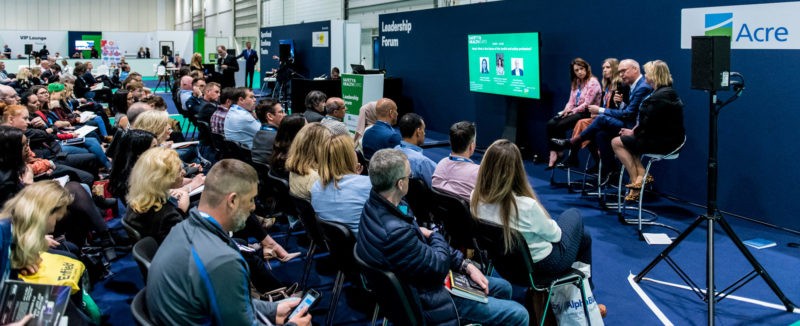Led by Heather Beach, Director at the Healthy Work Company, this discussion on the second day of Safety and Health Expo, involved Aoife Devaney, Assistant Health & Safety Advisor, St George Plc, Maeve O’Loughlin, Middlesex University, and James Pomeroy, Group Health, Safety, Environment and Security Director, Lloyd’s Register.

Discussing the future of the health and safety profession, the panel talked about what the attributes and qualifications of a good H&S professional should be. Maeve suggested that businesses should not pigeon hole people into a technical role, while Aoife added that going out and asking people the right questions has helped with her knowledge of the profession.
Talking about the terminology used in health and safety, the panel thought about whether some of it ‘turns the audience off’. Should we be reviewing some of this terminology? Aoife commented that it must be relatable to people, so whether talking to someone on the ground or talking to a director, it’s about knowing what you want to achieve and getting people to realise that health and safety is everyone’s priority. Maeve reiterated talking to people in ‘normal terms’ and James stressed the importance of making safety ‘human’ – demystifying it and having conversations with people.
Second career
Heather posed the question: Do you think that health and safety should continue to be a second career? Is there a benefit of having built up experience of the workplace and understanding the way a business works before becoming a health and safety professional? Maeve commented that it depends on the role, and it depends on the industry: “There needs to be an understanding of the business, having the right questions in order to get to grips with how an organisation works. Whether it’s a second career or not, personality can make up for experience if somebody has the right mind set to be able to understand it and not be the one to go in and say they have all the answers”, she said. James highlighted the benefits of working with teams and the mix of individuals within his teams mean some are coming into safety as a first career choice, and others have moved into it later on. “I really think its personality and passion that really determines things and it’s the mix of individuals [with different backgrounds] and their experiences”.
Thinking about the range of the role, Heather highlighted how it now encompasses a range of disciplines – health, safety, environment, security, wellbeing – what do all these things have in common? James said: “I think its relevance and context of the business, and thinking about ways to influence people’s decision making processes so that you can get good outcomes”. Considering whether health and safety will remain a specialist profession, Maeve commented: “I think a specialist will always be required in some way. Where that fits will be industry dependent, it’s too difficult to talk about these things in black and white. I see it as a risk profession, and to me it’s just how do you consider risk, how do you look at the context and then how do you bring that forward into management. These are skills that health and safety people have so if you get that right with health and safety, why can’t you look at environmental risk if you’re in a pollution control environment, or why can’t you look at mental health risk and wellbeing risk? The skills are transferable”.
Risk profession

(l-r) Aoife Devaney, Maeve O’Loughlin, James Pomeroy and Heather Beach.
Considering whether the term health and safety is tarnished to such a degree that it needs to be altered to get people involved or is it a question of the profession changing and the people will change with it, the panel suggested that it shouldn’t be over-complicated. James said: “If we think about rebranding [safety] we need to be really careful. There is a sense of what it’s about; it’s about protecting people’s health and wellbeing and promoting sustainability and safety”. Thinking about the point that safety people ‘do compliance and not risk’, Maeve said: “I hate the equation that says safety = compliance because I do believe that it should be a risk profession, we shouldn’t be working automatically, driving compliance for compliance sake. There’s a lot of compliance stuff out there that sets workers out to fail and doesn’t actually add value or make things safer. So treating it like a risk domain where you have to consider risk, having conversations around it, takes away that automatic thinking and box ticking without questioning whether it’s the right thing, or the thing that’s going to improve safety.”
An audience member posed a question around technology and risk assessing, asking the panel if this has ruined the health and safety profession. James answered: “The reality is that the technology that we’re using for safety is embarrassing. If you get in your car, it is surrounded by technology. But think about what you do when somebody goes into a confined space; bits of paper that don’t talk to each other. We need more and more technology and we need to introduce it but technology also introduces complexity. We know that complex systems cause accidents, it’s a real area that happens, we see it in aviation but we need to do it in a sensible way and we [need to] learn from the tragic incidents that Boeing are experiencing at the moment – that where we make systems complex and we don’t understand them, then its fundamental that we take time and do it properly. I think we absolutely need to avoid form filling, but I’m all for it [technology] and we need more and more. We need to triple the amount of investment we’re putting into technology.” But Maeve warned about taking away the skill from humans. And Aoife agreed there is a place for certain aspects of technology but when it comes down to it, it’s important to retain a human approach to things.
Advance your career in health and safety
Browse hundreds of jobs in health and safety, brought to you by SHP4Jobs, and take your next steps as a consultant, health and safety officer, environmental advisor, health and wellbeing manager and more.
Or, if you’re a recruiter, post jobs and use our database to discover the most qualified candidates.



Safety careers will always be moving towards the more-for-less culture we’re starting to see for everyone except the senior bods, who for some reason aren’t being burdened the same way but are still receiving a lot more money than is due.
Its all about knowing your limits and being a very engaging and listening type of person, if you cant build a rapport with the team your probably in the wrong place. All industries are doing their best to stay safe, but if the H&S professional gets off to a bad start there will be a mountain to climb in terms of maintaining compliance and the reputation of the profession.